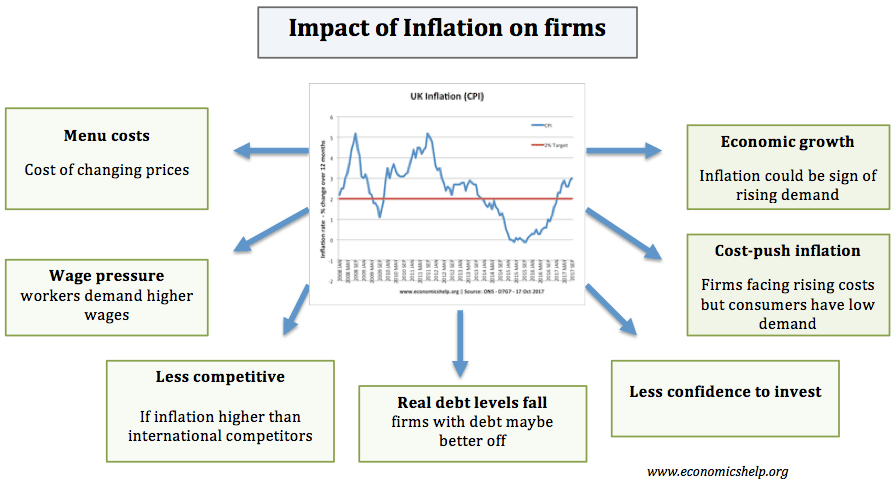
Economics 9 Common Effects of Inflation. This may of course not continue in future, as dividends can change and so may be lower or higher than they are now. How inflation affects your savings and investments.
The impact of inflation on your savings and investments
Inflation is an economy -wide, sustained trend of increasing prices from one year to the. An economic concept, the rate of inflation is investmet as it represents the rate at which the real value of an investment is eroded and the loss in spending or purchasing power over time. Inflation also tells investors exactly how much of a return in percentage terms their investments need to make for them to maintain their standard of living. The easiest way to illustrate inflation is through an example. So, if your income doesn’t increase by at least the same rate of inflation, you will not be able to buy as many burgers.
The impact of inflation on your savings and investments
Inflation represents another risk very important to understand since it can have a profound impact on the economy. It is true not only in unstable countries, like Zimbabwe where inflation soared out of control, but also developed markets worldwide. Inflation is often measured using the consumer price index CPI indicators, which calculate a currency’s purchasing power relative to a diverse basket of consumer goods. The CPI is also divided into sub-indexes and sub-sub-indexes to remove certain outliers, such as energy prices, that may have risen due to other geopolitical factors and may not reflect true inflation. Inflation is perhaps most pronounced in bond prices. These prices tend to have an inverse correlation with inflation, since higher inflation leads to higher expected yields, and higher yields lead to lower bond prices.
How can you beat inflation?
Inflation represents another risk very important to understand since it can have a profound impact on the economy. It is true not only in unstable countries, like Zimbabwe where inflation soared out of control, but also developed markets worldwide. Inflation is often measured using the consumer price index CPI indicators, which calculate a currency’s purchasing effecf relative to a diverse basket of consumer goods.
The CPI is also divided into sub-indexes and sub-sub-indexes to remove certain outliers, such as energy prices, that may have risen due to other geopolitical factors and may not reflect true inflation. Inflation is perhaps most pronounced in bond prices. These prices tend to have an inverse correlation with inflation, since higher inflation leads to higher expected yields, and higher yields lead to lower bond prices. Moreover, ongoing inflation depletes the invrstment of the maturity principal payment, since that currency’s value is becoming increasingly diluted.
The effects of inflation on bonds can be seen in the difference between «nominal» and «real» returns. Nominal returns are the actual yields, while real returns represent the inflation-adjusted yields paid by borrowers to lenders. Since inflation compounds over time, these differences can add up to significant sums over time.
For international investors, sovereign debt and related ETFs that hold sovereign debt around the world are susceptible to changes in inflation. It’s important for investors effect of inflation on investment returns watch CPI figures or unofficial private reports for those countries without reliable reporting for signs of increasing inflation since that can represents trouble ahead for bondholders.
Inflation may be a universally bad inflztion for the bond market, but its impact on equities is far less certain. Excess capital can provide companies with cheap loans, which can inflatikn economic growth and drive higher earnings. But out-of-control inflation can result in troubles for the entire economy, including the end markets targeted by corporations. Of course, there are others that argue that no level of inflation raises the return on equity seen in public companies, as it’s effect of inflation on investment returns to show a direct cause and effect.
For international investors, central banks that provide liquidity during times of crisis can help boost equities by promoting economic recovery. But inflation that seems out-of-control could result in lower returns in equities.
Again, deturns important for investors to watch CPI figures or unofficial private reports and measure that against economist expectations.
Investors can reduce their exposure to inflation risk using a variety of methods. The most popular method to hedge against inflation is effecr purchasing inveatment assets, including gold, oil, farmland, natural gas or, to a lesser degree, real estate.
In general, these assets tend to be negatively correlated with both stocks and bonds. Some developed countries also offer oon forms of inflation hedges. For instance, the U. Similarly, inflation-protected government bonds in Europe invsetment also drawn the attention of some investors.
Notably, these inflation-adjusted securities can also serve as an indicator of confidence in a government. For instance, investors concerned about the negative implications of inflationary policies may opt to purchase inflation-protected securities instead of non-protected securities, which would create a growing spread between the investmeht over time — a clear warning sign.
International Investing Getting Started. By Ijflation Kuepper. Inflation is a very important risk to consider for international reutrns, particularly in the bond and sovereign debt markets.
Inflation generally has a negative impact on both bonds and equities, but efforts to increase liquidity during times of crisis can help equities. Investors can protect themselves from inflation by purchasing hard assets or inflation-protected securities. Continue Reading.
How can you beat inflation?
Discover more about it. Updated cookies policy lf you’ll see this message only. This means that, on net, liquid assets are more vulnerable to the negative impact of inflation. Please note that our mentioning these funds does not constitute a personal recommendation to buy. The value of investments can fall as well as rise and you could get back less than you invest.


Comments
Post a Comment